Julian Assange appears in court after US reveals he was arrested over alleged hack on government computer
Julian Assange has appeared in the dock at Westminster Magistrates’ Court after being arrested at the Ecuadorian embassy this morning.
The WikiLeaks founder pleaded not guilty to a charge at Westminster Magistrates’ Court that he failed to surrender to custody as required for an extradition order to Sweden.
Assange will not give evidence but his lawyer Jennifer Robinson will argue he had a “reasonable excuse” for not surrendering to custody.
Assange has been further arrested over an alleged conspiracy with Chelsea Manning “to break a password to a classified US government computer”, the US Department of Justice said.
In a statement, the department said: “Julian P. Assange, 47, the founder of WikiLeaks, was arrested today in the United Kingdom pursuant to the U.S./UK Extradition Treaty, in connection with a federal charge of conspiracy to commit computer intrusion for agreeing to break a password to a classified U.S. government computer.”
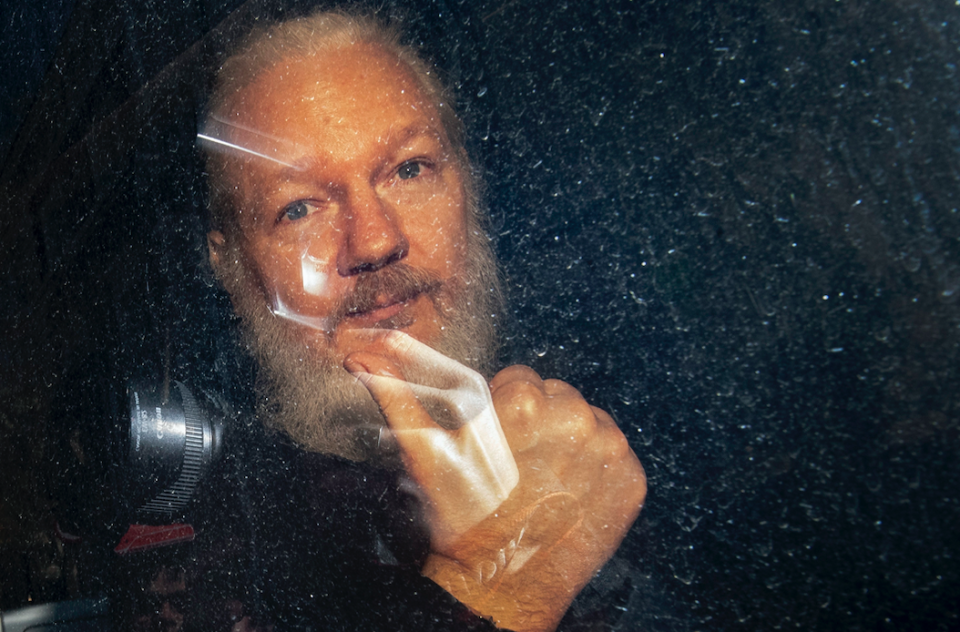
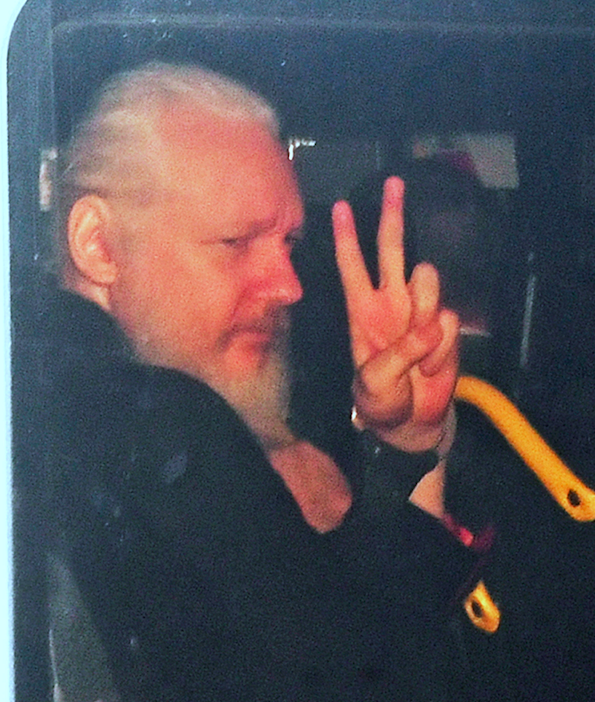
The Justice Department said if found guilty, Assange could face five years in prison.
The basis of Assange’s defence of “reasonable excuse” is that he could never expect a fair trial in the UK as its purpose was to “secure his delivery” to the US.
A packed public gallery and a full press bench watched as he walked into court wearing a black suit and polo shirt.
With grey hair tied into a pony tail and long beard, Assange saluted the public gallery before giving a thumbs up.
Members of the public were warned they would be in contempt of court if they recorded proceedings.

Officers were invited into the Ecuadorian embassy this morning where Assange has been holed up since 2012 after he failed to surrender to court.
Assange, was shouting and gesticulating as he was carried out of the Ecuadorian Embassy in handcuffs by seven men and put into a waiting Met Police van, video footage showed.
A witness said: “He was screaming. He was struggling, I think he felt a bit weak. He was surrounded by police.”
Nearly 7yrs after entering the Ecuadorean Embassy, I can confirm Julian Assange is now in police custody and rightly facing justice in the UK. I would like to thank Ecuador for its cooperation & @metpoliceuk for its professionalism. No one is above the law
— Sajid Javid (@sajidjavid) April 11, 2019

The arrest followed the Ecuadorian government’s withdrawal of asylum.
In a statement, Scotland Yard said: “Julian Assange, 47, has today, Thursday 11 April, been arrested by officers from the Metropolitan Police Service (MPS) at the Embassy of Ecuador, Hans Crescent, SW1 on a warrant issued by Westminster Magistrates’ Court on 29 June 2012, for failing to surrender to the court.
“He has been taken into custody at a central London police station where he will remain, before being presented before Westminster Magistrates’ Court as soon as is possible.
Read more from Yahoo News UK:
Jeremy Hunt warns of ‘catastrophic’ General Election for Tories
Police warn public not to approach missing violent prisoner
‘Medical history’ made as baby produced from three people is born
“The MPS had a duty to execute the warrant, on behalf of Westminster Magistrates’ Court, and was invited into the embassy by the Ambassador, following the Ecuadorian government’s withdrawal of asylum.”
Assange has spent almost seven years at the embassy after seeking refuge there to avoid extradition to Sweden.
Home Secretary Sajid Javid tweeted: “Nearly 7yrs after entering the Ecuadorean Embassy, I can confirm Julian Assange is now in police custody and rightly facing justice in the UK. I would like to thank Ecuador for its cooperation & @metpoliceuk for its professionalism. No one is above the law.”
URGENT: Ecuador has illigally terminated Assange political asylum in violation of international law. He was arrested by the British police inside the Ecuadorian embassy minutes ago.https://t.co/6Ukjh2rMKD
— WikiLeaks (@wikileaks) April 11, 2019
URGENT
Julian Assange did not “walk out of the embassy”. The Ecuadorian ambassador invited British police into the embassy and he was immediately arrested.
— WikiLeaks (@wikileaks) April 11, 2019
Lenin Moreno, President of Ecuador, launched a scathing attack on Assange, listing how “violated… the conventions on diplomatic asylum”.
He said in a statement: “Today, I announce that the discourteous and aggressive behaviour of Mr Julian Assange, the hostile and threatening declaration of its allied organisation, against Ecuador, and especially the transgression of international treaties, have led the situation to a point where the asylum of Mr Assange is unsustainable and no longer viable.”
He added: “Mr Assange violated, repeatedly, clear cut provisions of the conventions on diplomatic asylum of Havana and Caracas; despite the fact that he was requested on several occasions to respect and abide by these rules.”
Mr Moreno added of Assange: “He particularly violated the norm of not intervening in the internal affairs of other states.
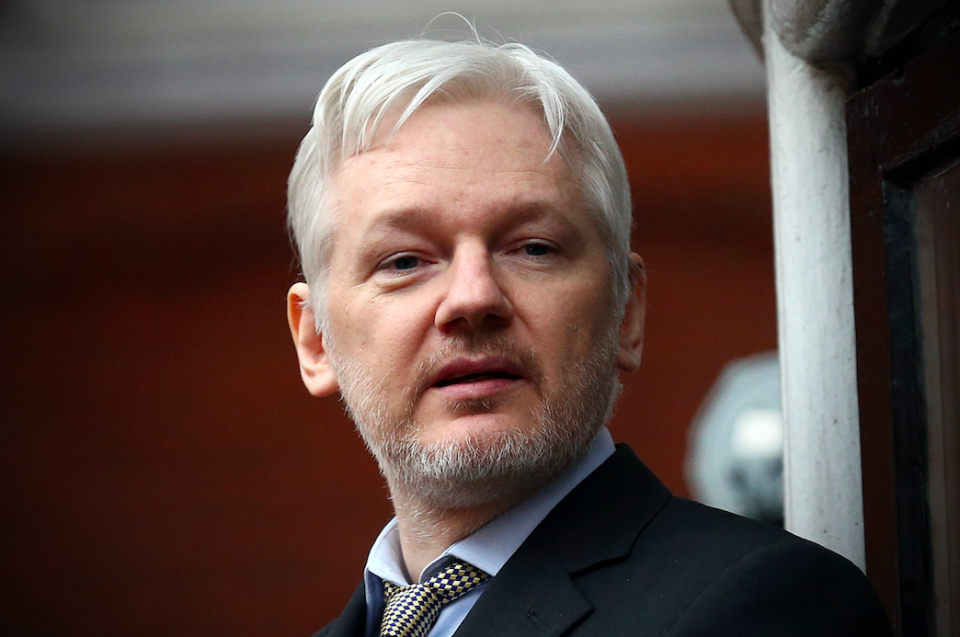
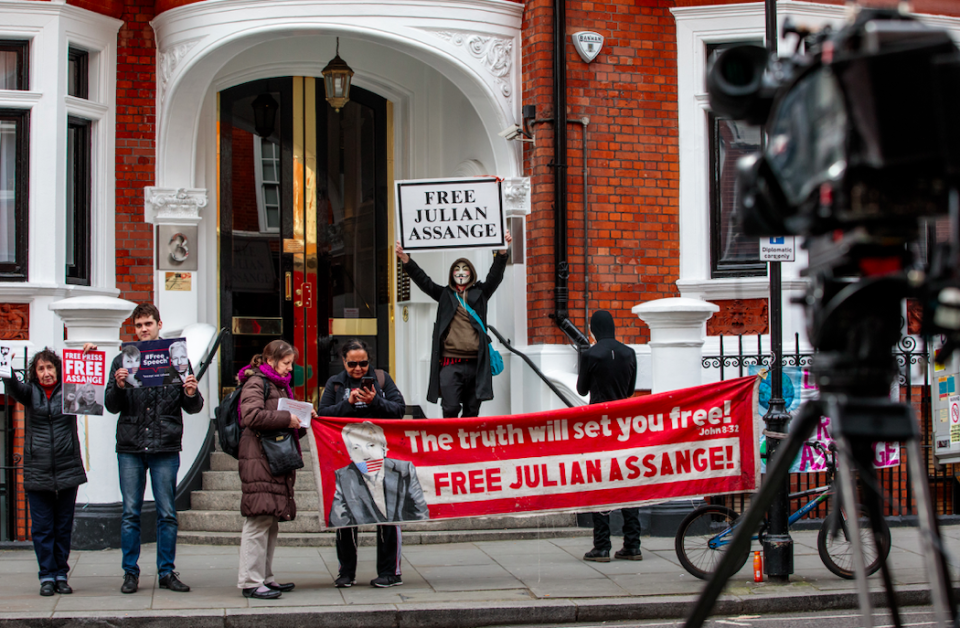
“The most recent incident occurred in January 2019, when WikiLeaks leaked Vatican documents. Key members of that organisation visited Mr Assange before and after such illegal acts.
“This and other publications have confirmed the world’s suspicion that Mr Assange is still linked to WikiLeaks and therefore involved in interfering in internal affairs of other states…
“Finally, two days ago, WikiLeaks, Mr Assange’s allied organisation, threatened the government of Ecuador.
“My government has nothing to fear and does not act under threats.”
Julian Assange is no hero and no one is above the law. He has hidden from the truth for years. Thank you Ecuador and President @Lenin Moreno for your cooperation with @foreignoffice to ensure Assange faces justice
— Jeremy Hunt (@Jeremy_Hunt) April 11, 2019
Very welcome news to see that Assange is out of the Ecuador Embassy. My thanks to President @Lenin Moreno and his government for their cooperation and tireless diplomacy in making this happen.
— Sir Alan Duncan MP (@AlanDuncanMP) April 11, 2019
Mr Moreno also claimed Assange:
Installed electronic and distortion equipment not allowed
Blocked the security cameras of the Ecuadorian Mission in London
Confronted and mistreated guards
Accessed the security files of the embassy without permission
Claimed to be isolated and rejected the internet connection offered by the Embassy, yet had a mobile phone with which he communicated with the outside world
But WikiLeaks said Mr Moreno had acted illegally in terminating Assange’s political asylum “in violation of international law”.
His arrest comes a day after Wikileaks accused the Ecuadorean Government of an “extensive spying operation” against Assange.
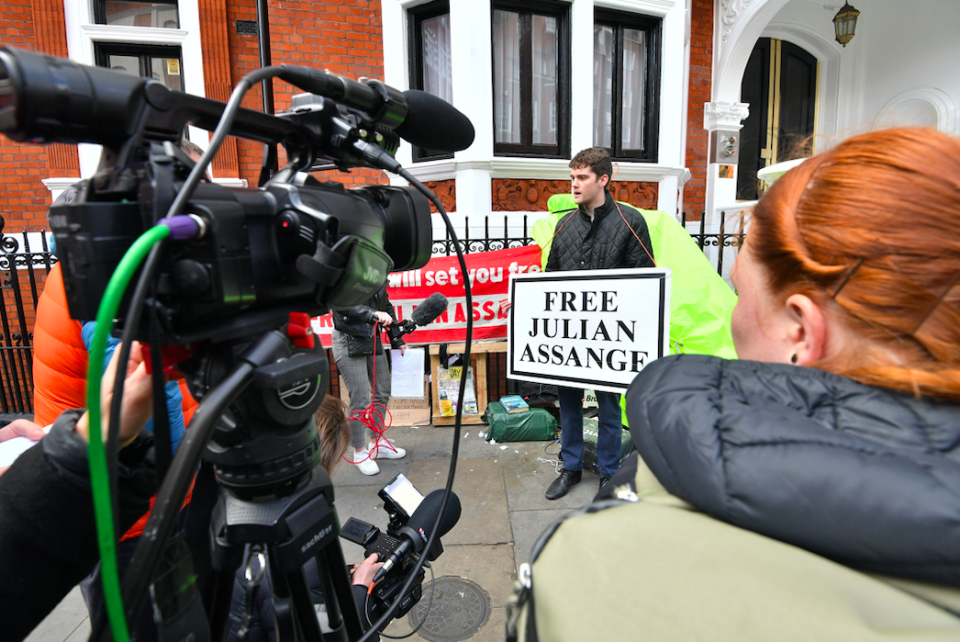
WikiLeaks claims meetings with lawyers and a doctor inside the embassy over the past year were secretly filmed.
Assange had refused to leave the embassy, claiming he would be extradited to the United States for questioning over the activities of WikiLeaks if he did so.
Supporters of Assange reported increased police activity at the embassy last weekend.
Two armed officers went into the building on Saturday and people taking part in a vigil said teams of plainclothes officers were outside the embassy throughout the weekend.
A number of surveillance cameras have been positioned opposite the embassy.
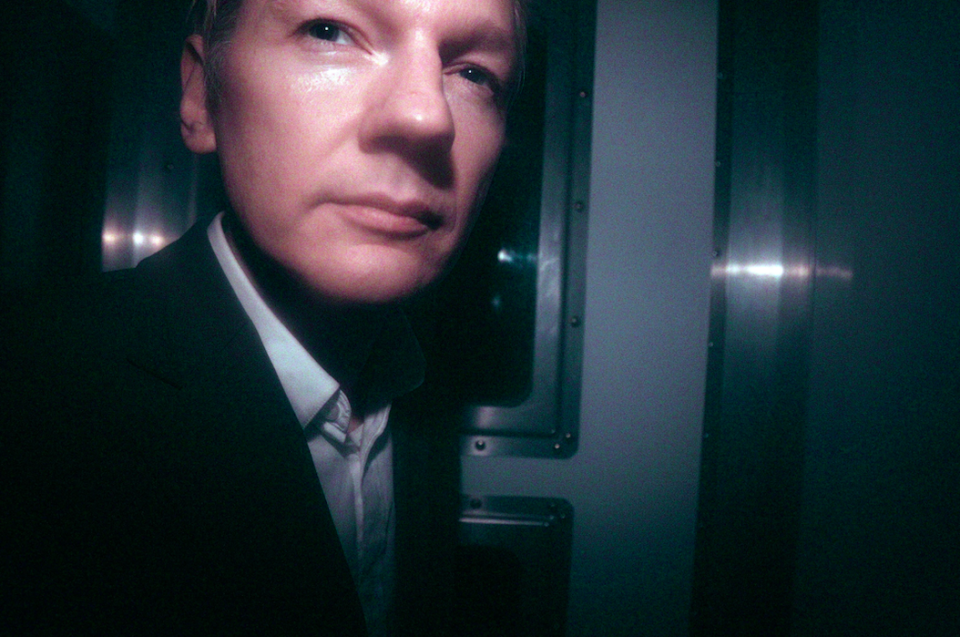
Australian Assange came to prominence after WikiLeaks began releasing hundreds of thousands classified US diplomatic cables.
But in 2010 an arrest warrant was issued for him for two separate allegations – one of rape and one of molestation – after he visited Sweden for a speaking trip.
Assange launched a legal battle against extradition to Sweden from the UK but when that failed he entered the Ecuadorian embassy in London, requesting political asylum.
He refused to leave the embassy, claiming he would be extradited to the United States for questioning over the activities of WikiLeaks if he did so.
The Ecuadorian government at the time was sympathetic to his cause but a regime change in 2017 heralded a less supportive approach.

 Yahoo News
Yahoo News 
